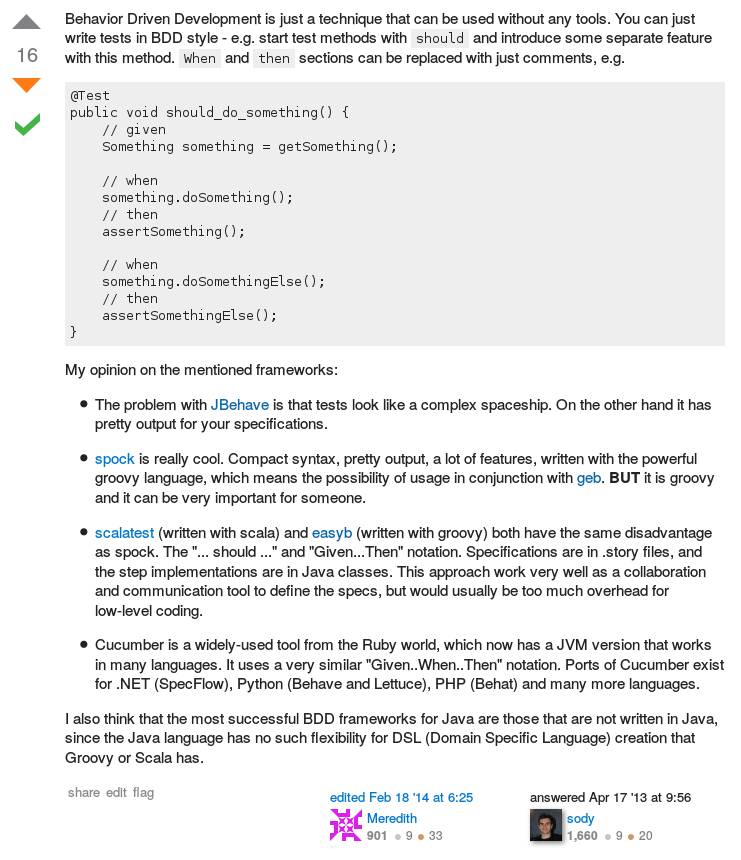Take your Automated Tests to the Next Level
Dr. Jan Schäfer
19. Oktober, 2016
Software Architektur München
Amazon deploys to production every second
Continuous Delivery
Continuous Delivery
>50% of the code is test code
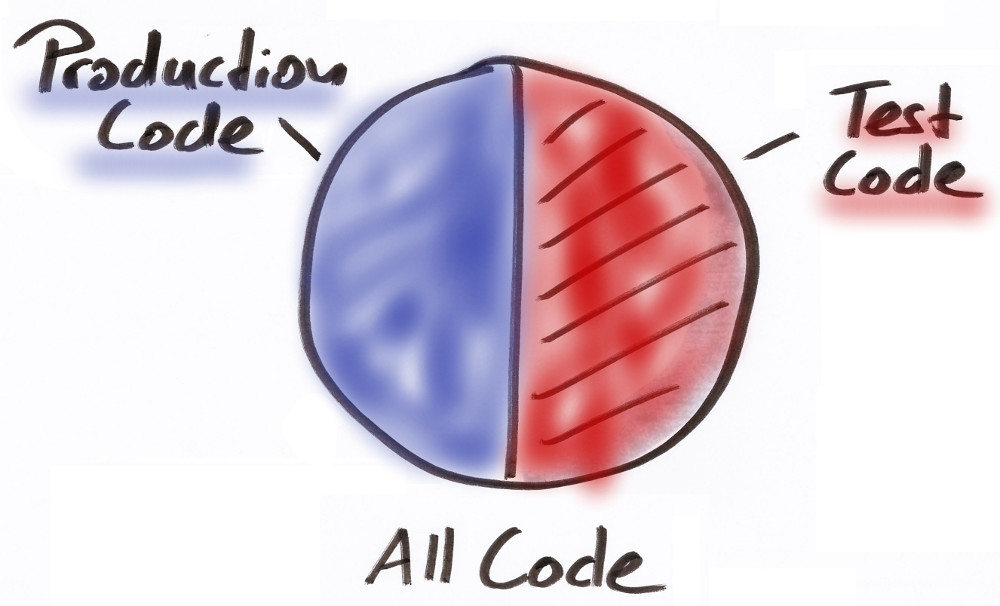
Test Code has no Business Value
Costs of Automated Tests
"... automated acceptance tests can be costly to maintain. Done badly, they can inflict a significant cost on your delivery team."

Jez Humble and David Farley
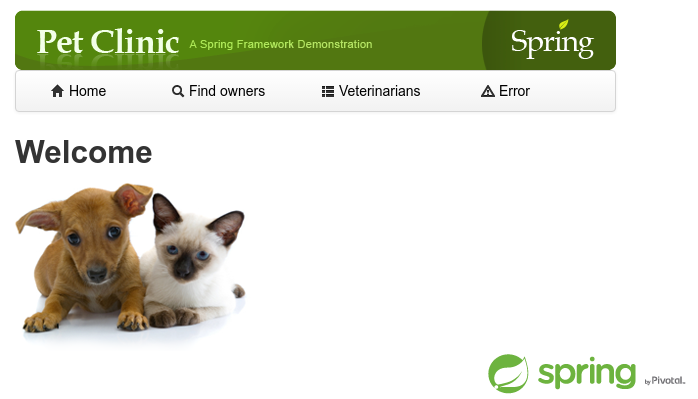
Typical Test
@Test
public void shouldInsertPetIntoDatabaseAndGenerateId() {
Owner owner6 = this.clinicService.findOwnerById(6);
int found = owner6.getPets().size();
Pet pet = new Pet();
pet.setName("bowser");
Collection<PetType> types = this.clinicService.findPetTypes();
pet.setType(EntityUtils.getById(types, PetType.class, 2));
pet.setBirthDate(new DateTime());
owner6.addPet(pet);
assertThat(owner6.getPets().size()).isEqualTo(found + 1);
this.clinicService.savePet(pet);
this.clinicService.saveOwner(owner6);
owner6 = this.clinicService.findOwnerById(6);
assertThat(owner6.getPets().size()).isEqualTo(found + 1);
// checks that id has been generated
assertThat(pet.getId()).isNotNull();
}
Issues with typical automated tests
- Many technical and irrelevant details
- Point of the test often hard to grasp
- Code duplication
- Can only be read by developers
- Cannot be used as documentation
Behavior-Driven Development
Feature Files (Gherkin)
findowners.feature
Feature: Finding Owners
Scenario: Owners can be found by last name
Given an owner with last name "John"
When searching for "John"
Then exactly the given owner is found
Step Implementation (Java)
public class CustomerStepdefs {
@Given("an owner with last name (.*)")
public void anOwnerWithLastName(String lastName) { ... }
@When("searching for (.*)")
public void searchingFor(String lastName) { ... }
@Then("exactly the given owner is found")
public void exactlyTheGivenOwnerIsFound() { ... }
}
Cost of Tools like Cucumber
"... while modern tools [like Cucumber] reduce the overhead of writing executable acceptance criteria and keeping them synchronized with the acceptance test implementation, there is inevitably some overhead."

Jez Humble and David Farley
BDD Frameworks for Java
- Cucumber: Plain Text + Java
- JBehave: Plain Text + Java
- Concordion: HTML + Java
- Fitness: Wiki + Java
- Spock: Groovy
- ScalaTest: Scala
- Jnario: Xtend
- Serenity (similar concepts as JGiven)
Stack Overflow?
Goals
- Developer friendly (low maintancence overhead)
- Readable tests in in Given-When-Then-Form (BDD)
- Reusability of test code
- Readable by domain experts
Scenarios in JGiven
import org.junit.Test;
import com.tngtech.jgiven.junit.ScenarioTest;
public class FindOwnerTest
extends ScenarioTest<GivenOwner, WhenSearching, ThenOwner> {
@Test
public void owners_can_be_found_by_last_name() {
given().an_owner_with_last_name("John");
when().searching_for("John");
then().exactly_the_given_owner_is_found();
}
}
Stage Classes
@JGivenStage // only needed when using Spring
public class WhenSearching extends Stage<WhenSearching> {
@Autowired
ClinicService clinicService;
@ScenarioState
Owner owner;
public WhenSearching searching_for(String name) {
owner = this.clinicService.findOwnerByName(name);
return this;
}
}
Two Layers
[...] organize the code into two layers: an implementation layer [...] and, a declarative layer [...] to describe the purpose of each fragment. The declarative layer describes what the code will do, while the implementation layer describes how the code does it. The declarative layer is, in effect, a small domain-specific language embedded (in this case) in Java.
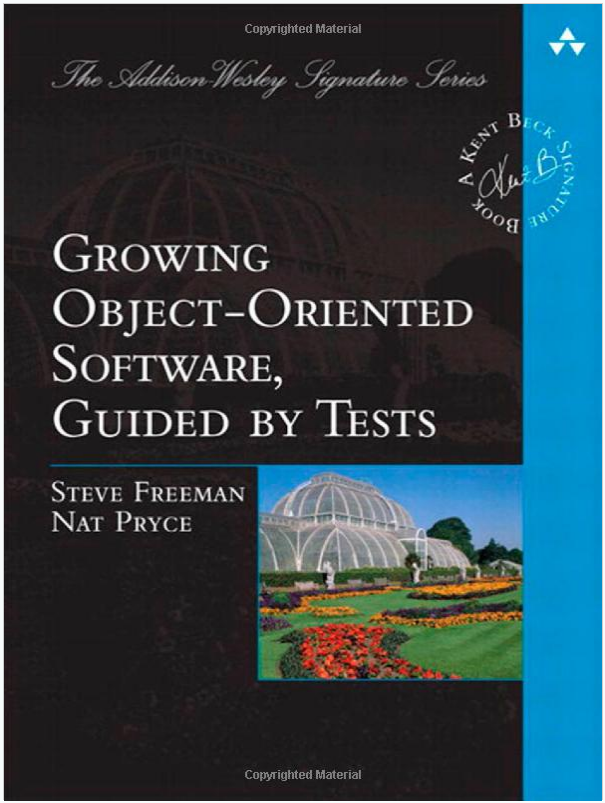
Steve Freeman and Nat Pryce
Console Output
Owners can be found by last name
Given an owner with last name "John"
When searching for "John"
Then exactly the given owner is found
HTML5-App
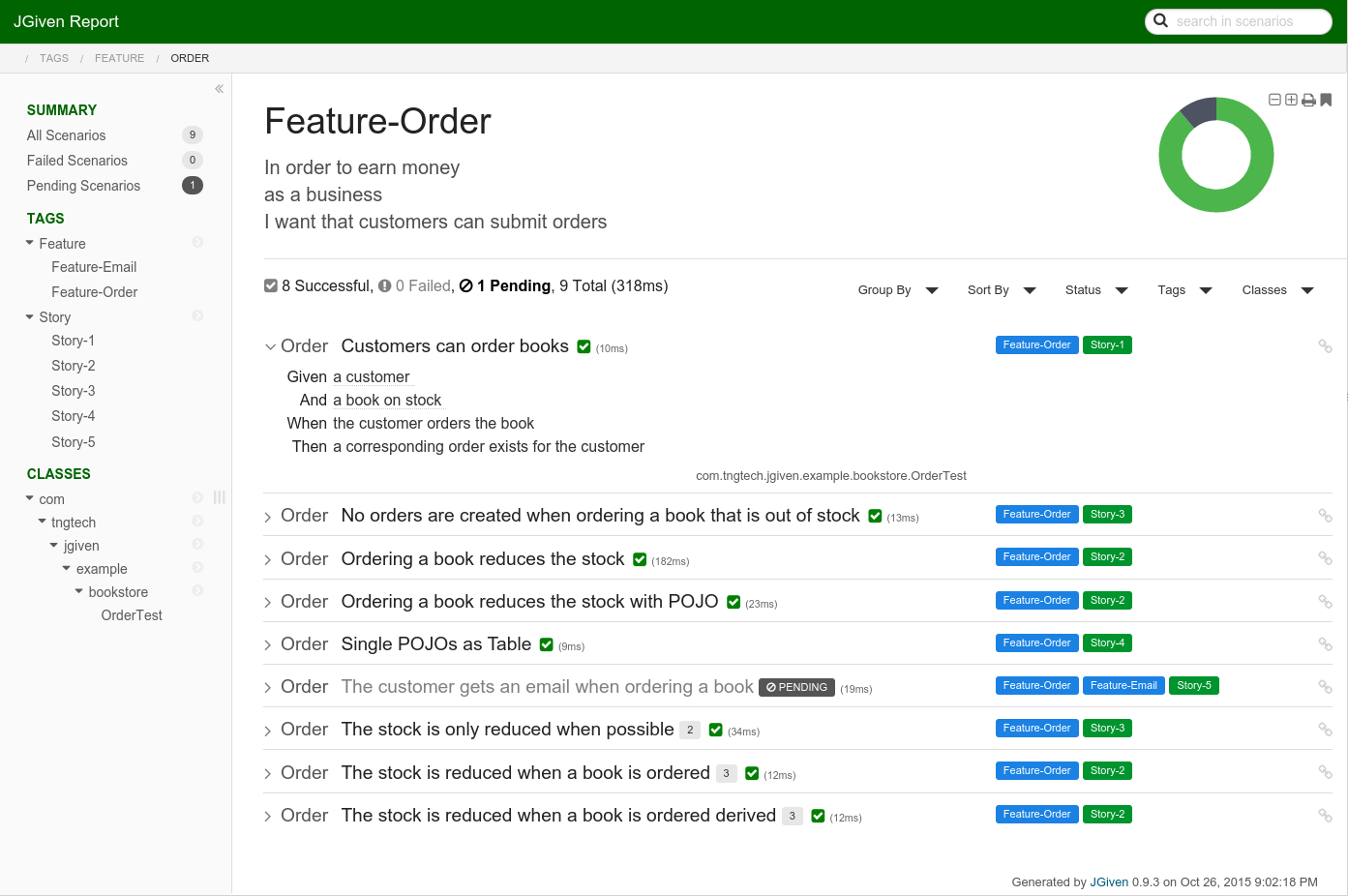
Practical Experience
- 3 years of experience in a large Java Enterprise project (up to 70 developers)
- Over 3000 Scenarios
- Readability and reusability of test code has been greatly improved
- Maintanence costs of automated tests have been reduced (no hard numbers)
- Developers and domain experts work together on the scenarios
- Well accepted by developers
- Easy to learn by new developers
Additional Features
Parameterized Steps
given().a_customer_with_name( "John" );
Report
Given a customer with name John
Parameters within the Sentence?
Given there are 5 coffees left
$ to the rescue!
given().there_are_$_coffees_left( 5 );
Parameterized Scenarios
@Test
@DataProvider({
"1, 0",
"3, 2",
"5, 4"})
public void the_stock_is_reduced_when_a_book_is_ordered( int initial,
int left ) {
given().a_customer()
.and().a_book()
.with().$_items_on_stock( initial );
when().the_customer_orders_the_book();
then().there_are_$_items_left_on_stock( left );
}Parameterized Runner and Theories of JUnit are also supported
Parameterized Scenarios
Console Output
The stock is reduced when a book is ordered
Given a customer
And a book
With <initial> items on stock
When the customer orders the book
Then there are <left> items left on stock
Cases:
| # | initial | left | Status |
+---+---------+------+---------+
| 1 | 1 | 0 | Success |
| 2 | 3 | 2 | Success |
| 3 | 5 | 4 | Success |Parameterized Scenarios
HTML Report
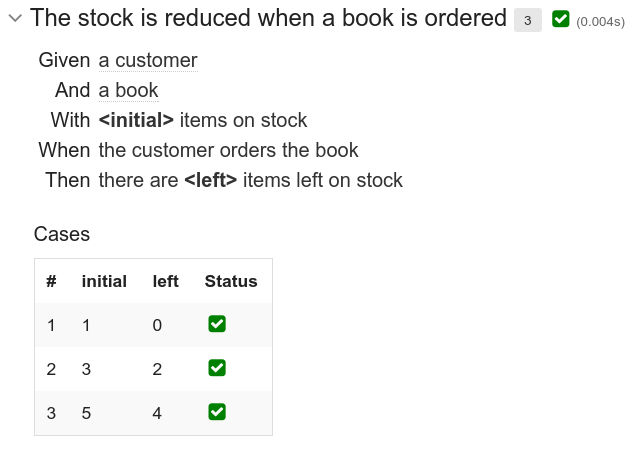
Parameter Formatting
- Default: toString()
- @Format( MyCustomFormatter.class )
- @Formatf( " -- %s -- " )
- @MyCustomFormatAnnotation
Example
@OnOff
@Format( value = BooleanFormatter.class, args = { "on", "off" } )
@Retention( RetentionPolicy.RUNTIME )
@interface OnOff {}Apply to Parameter
public SELF the_machine_is_$( @OnOff boolean onOrOff ) { ... }Use Step
given().the_machine_is_$( false );
Report
Given the machine is off
Tables as Parameters
SELF the_following_books_are_on_stock( @Table String[][] stockTable ) {
...
}- All iterable types are supported
Tables as Parameters
@Test
public void ordering_a_book_reduces_the_stock() {
given().the_following_books_on_stock(new String[][]{
{"id", "name", "author", "stock"},
{"1", "The Hitchhiker's Guide to the Galaxy", "Douglas Adams", "5"},
{"2", "Lord of the Rings", "John Tolkien", "3"},
});
when().a_customer_orders_book("1");
then().the_stock_looks_as_follows(new String[][]{
{"id", "name", "author", "stock"},
{"1", "The Hitchhiker's Guide to the Galaxy", "Douglas Adams", "4"},
{"2", "Lord of the Rings", "John Tolkien", "3"},
});
}Tables as Parameters
Console Output
Ordering a book reduces the stock
Given the following books on stock
| id | name | author | stock |
+----+--------------------------------------+---------------+-------+
| 1 | The Hitchhiker's Guide to the Galaxy | Douglas Adams | 5 |
| 2 | Lord of the Rings | John Tolkien | 3 |
When a customer orders book 1
Then the stock looks as follows
| id | name | author | stock |
+----+--------------------------------------+---------------+-------+
| 1 | The Hitchhiker's Guide to the Galaxy | Douglas Adams | 4 |
| 2 | Lord of the Rings | John Tolkien | 3 |Tables as Parameters
HTML Report
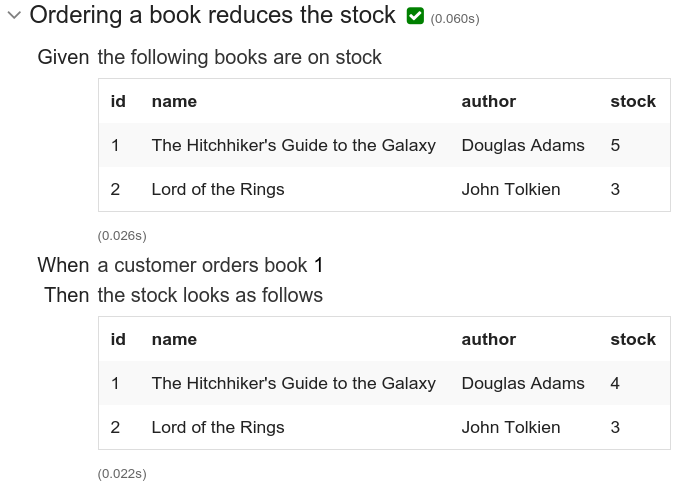
@BeforeScenario und @AfterScenario
public class GivenSteps extends Stage<GivenSteps> {
@ProvidedScenarioState
File temporaryFolder;
@BeforeScenario
void setupTemporaryFolder() {
temporaryFolder = ...
}
@AfterScenario
void deleteTemporaryFolder() {
temporaryFolder.delete();
}
}
@ScenarioRule
public class TemporaryFolderRule {
File temporaryFolder;
public void before() {
temporaryFolder = ...
}
public void after() {
temporaryFolder.delete();
}
}
public class GivenSteps extends Stage<GivenSteps> {
@ScenarioRule
TemporaryFolderRule rule = new TemporaryFolderRule();
}
@AfterStage, @BeforeStage
public class GivenCustomer extends Stage<GivenSteps> {
CustomerBuilder builder;
@ProvidedScenarioState
Customer customer;
public void a_customer() {
builder = new CustomerBuilder();
}
public void with_age(int age) {
builder.withAge(age);
}
@AfterStage
void buildCustomer() {
customer = builder.build();
}
}
Tags
@Test @FeatureEmail
void the_customer_gets_an_email_when_ordering_a_book() {
...
}Mit Werten
@Test @Story( "ABC-123" )
void the_customer_gets_an_email_when_ordering_a_book() { ... }@Pending
- Marks the whole scenario or single steps as not implemented yet
- Steps are skipped, but appear in the report
HTML Report

@Hidden
- Marks methods to not appear in the report
- Useful for technically required methods
@Hidden
public SELF doSomethingTechnical() { ... }Extended Step Descriptions
@ExtendedDescription("The Hitchhiker's Guide to the Galaxy, "
+ "by default the book is not on stock" )
public SELF a_book() { ... }HTML Report
Attachments
public class Html5ReportStage {
@ExpectedScenarioState
protected CurrentStep currentStep; // provided by JGiven
protected void takeScreenshot() {
String base64 = ( (TakesScreenshot) webDriver )
.getScreenshotAs( OutputType.BASE64 );
currentStep.addAttachment(
Attachment.fromBase64( base64, MediaType.PNG )
.withTitle( "Screenshot" ) );
}
}HTML Report
Summary
- Automated tests are required for Continuous Delivery
- Test code is a significant cost factor
- Typical test code has a lot of issues
- Existing BDD tools either have an overhead or are not Java
JGiven
- Developer friendly
- Highly modular and reusable test code
- Just Java, no further language is needed
- Easy to integrate into existing test infrastructures
- Open Source (Apache 2 Licence)
- Maven and Jenkins plugins
- Domain experts can read scenario reports
- Domain experts can not write scenarios
(But they can write them in any other format and developers can easily translate them to JGiven)

